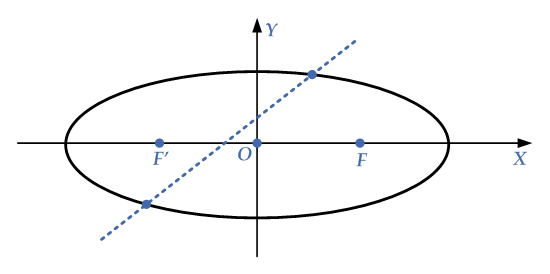Intersection of a Line and Ellipse
The line $$y = mx + c$$ intersects with the ellipse $$\frac{{{x^2}}}{{{a^2}}} + \frac{{{y^2}}}{{{b^2}}} = 1$$ at two points maximum and the condition for such intersection is that $${c^2} < {a^2}{m^2} + {b^2}$$.
Consider the equation of a line is represented by
\[y = mx + c\,\,\,{\text{ – – – }}\left( {\text{i}} \right)\]
Consider that the standard equation of an ellipse with vertex at origin $$\left( {0,0} \right)$$ can be written as
\[\frac{{{x^2}}}{{{a^2}}} + \frac{{{y^2}}}{{{b^2}}} = 1\,\,\,{\text{ – – – }}\left( {{\text{ii}}} \right)\]
To find the point of intersection of straight line (i) and the given ellipse (ii), using the method of solving simultaneous equations we solve equation (i) and equation (ii), in which one equation is in quadratic form and the other is in linear form. So we take the value of $$y$$ from equation (i) and put this value in equation of ellipse (ii), i.e. the equation of ellipse becomes
\[\begin{gathered} \frac{{{x^2}}}{{{a^2}}} + \frac{{{{\left( {mx + c} \right)}^2}}}{{{b^2}}} = 1 \\ \Rightarrow \frac{{{b^2}{x^2} + {a^2}{{\left( {mx + c} \right)}^2}}}{{{a^2}{b^2}}} = 1 \\ \Rightarrow {b^2}{x^2} + {a^2}{\left( {mx + c} \right)^2} = {a^2}{b^2} \\ \Rightarrow {b^2}{x^2} + {a^2}\left( {{m^2}{x^2} + 2mcx + {c^2}} \right) = {a^2}{b^2} \\ \Rightarrow {b^2}{x^2} + {a^2}{m^2}{x^2} + 2{a^2}mcx + {a^2}{c^2} – {a^2}{b^2} = 0 \\ \Rightarrow \left( {{a^2}{m^2} + {b^2}} \right){x^2} + 2{a^2}mcx + {a^2}\left( {{c^2} – {b^2}} \right) = 0\,\,\,{\text{ – – – }}\left( {{\text{iii}}} \right) \\ \end{gathered} \]

Since equation (iii) is a quadratic equation in $$x$$ it can have at most two roots. This shows that the line (i) can intersect the ellipse (ii) at two points maximum. This is also clear from the given diagram.
Equation (iii) will have two real roots if
\[\begin{gathered} {\text{Discriminant > 0}} \\ \Rightarrow {\left( {2{a^2}mc} \right)^2} – 4\left( {{a^2}{m^2} + {b^2}} \right){a^2}\left( {{c^2} – {b^2}} \right) > 0 \\ \Rightarrow 4{a^4}{m^2}{c^2} – 4{a^2}\left( {{a^2}{m^2} + {b^2}} \right)\left( {{c^2} – {b^2}} \right) > 0 \\ \Rightarrow {a^2}{m^2}{c^2} – \left( {{a^2}{m^2} + {b^2}} \right)\left( {{c^2} – {b^2}} \right) > 0 \\ \Rightarrow – {b^2}{c^2} + {a^2}{m^2}{b^2} + {b^4} > 0 \\ \Rightarrow {c^2} – {a^2}{m^2} – {b^2} < 0 \\ \Rightarrow \boxed{{c^2} < {a^2}{m^2} + {b^2}} \\ \end{gathered} \]

Dhatshin Karunamoorthy
August 6 @ 4:02 pm
The equation work is slightly wrong
check your solution please it should be c2a2m2+b2
⇒–b2c2+a2m2b2+b4>0
⇒a2m2b2+b4>b2c2
⇒a2m2+b2>c2
⇒c2<a2m2+b2
eMathZone
August 8 @ 10:39 pm
Thank you, we have now corrected this.
Sharcoux
March 10 @ 3:49 am
There is something wrong here. At the beginning, you say:
“The condition for such intersection is that c2>a2m2+b2.”
And the conclusion says that
“Equation (iii) will have two real roots if c2<a2m2+b2"
So which one is it?
eMathZone
March 10 @ 4:27 am
Sorry about this mistake, it’s the second one c2 < a2m2 + b2